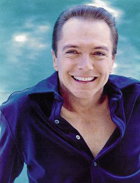
David Cassidy on the Web
Beyond Happy
January 5, 2000
By Phil Rosenthal
Chicago Sun Times
You listen to a middle-aged David Cassidy talk with such affection for his days as a pop-culture icon on TV's "The Partridge Family" and you wonder aloud if he's always been so sanguine.
"Phil? You have to forgive me because I didn't go to college," Cassidy said, more amused than put off. "Sanguine?"
Um, it means cheerful. I think.
Sorry.
"I was gonna get my Webster's out but you know, I've got to be honest with you," said Cassidy, who, as executive producer, is bringing his life story to NBC in "The David Cassidy Story," a (STAR)(STAR) movie set for 8 p.m. Sunday on WMAQ-Channel 5. "I went to high school because I wanted to meet chicks and play guitar (rather than for) academics.
"But no, I can't say I was always this cheerful about it. Certainly, for a few years after, I wanted to distance myself from it. But I was never apologetic for being so successful or about anything that I had done, about my work, about my music, about selling millions of records, about making millions of people happy."
Cassidy today lives in Las Vegas, though he pines for a return someday to New York, where he grew up as the son of actor Jack Cassidy (who's portrayed with a certain elan by Malcolm McDowell in the NBC film) and stepson of his TV mom, Shirley Jones.
Vegas is where he can both perform - he has a big revue about to open at the Rio - and yet maintain a semi-normal family life with Sue Shifrin, a longtime friend who became his second wife 14 years ago, and Bo, their 8-year-old son. And it is Shifrin who helped Cassidy come around and come to terms with himself.
"She had a lot to do with my metamorphosis as a human, a person and my career," he said.
Their relationship is a huge part of the NBC movie. And while Cassidy's take is very likely more true to fact than "Come On, Get Happy," the film former "Partridge" co-star Danny Bonaduce sanctioned for ABC earlier this season, it isn't as fun.
"Cassidy" is an honest telling of a pop star's rise, fall and rise again with the portrait of Cassidy just unflattering enough to be believable. But it lacks the sitcom sensibility that made both the original 1970-74 "Partridge Family" series and Bonaduce's recollection of it watchable.
That said, NBC's version does feature several renditions of "I Woke Up in Love This Morning" - including a curtain call of sorts in which Cassidy himself does a duet with his alter ego (Andrew Kavovit).
Given the glut of celebrity biography shows - VH1 and E! both have weighed in on Cassidy and the Partridge Family - frankly an earnest dramatized retelling of someone's life doesn't make for much of a movie.
And yet there is inherent drama in the inner struggle that comes from how stardom insulates one from the real world, the fight to keep from "putting a bullet in your head or overdosing on drugs and/or being self-destructive in some sort of way," as Cassidy puts it.
"That kind of lifestyle over an extended period of time, where you live in a bubble, where you don't really have contact with the human race (takes a toll)," he said. "I talked about it with John Lennon at great length because he had already gone through it. He called it his `demystification' period. . . . You can feel yourself become sensitive again. You have to make baby steps to becoming part of society again."
In Cassidy's case, the breakdown, such as it was, came at the same time that a business scam cost him millions and both his father and manager died.
"I didn't work - intentionally - for three years," he said.
He returned with a successful "Police Story" movie that was so successful it led to a hastily thrown together series, NBC's 1978-79 "David Cassidy - Man Undercover." But that, he said, triggered "one of the most difficult periods in my life."
Through it all, he claims, he never "felt bitter . . . angry or hostile about my participation" in "The Partridge Family."
"Whether you loved it or hated it, it was well-written and designed and well-crafted and performed," Cassidy said. "Otherwise, it wouldn't have had the enormous impact that it had.
"I've been criticized for not wanting go back and do one of those reunions, but I just don't want to mess with what it is."
Sometimes it's best to leave a memory alone. It's more sanguine.
